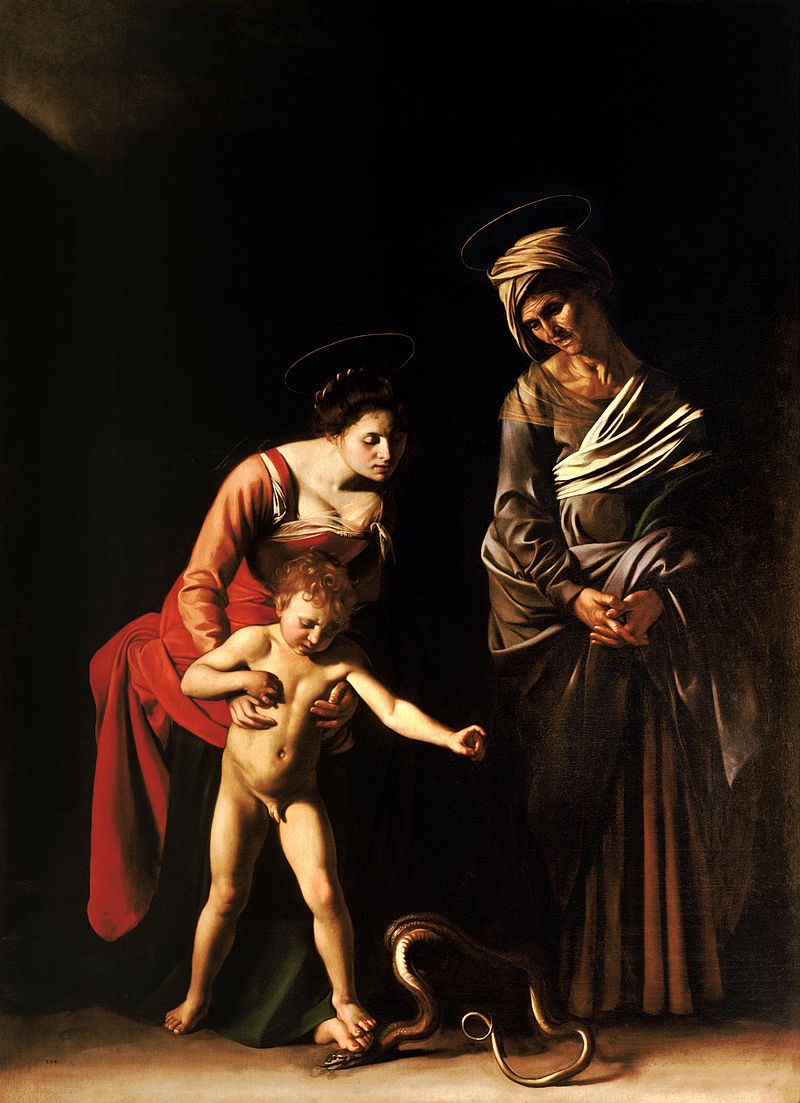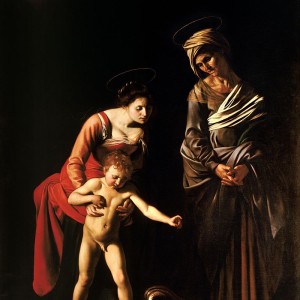The instructions for this practice homily were for (a) the subject to be on the Feast of Our Lady of the Rosary, October 7th; and (b) to use either the readings of the day, or the readings from the Common of the Blessed Virgin Mary. I chose the later, with the First Reading from Gen 3:9-15, 20.

The world has just learned that three more Assyrian Christians have been executed in a particularly barbaric way by ISIS… who’ve promised to continue this murderous campaign if the Christians of the Middle East don’t submit. Pope Francis has repeatedly tried to call our attention to the ongoing genocide of these Christians, and that’s exactly what it is: a systematic attempt to wipe Christians off of the map, permanently.
All of this bloodshed is being perpetrated in the name of a radical and expansionist form of Islam. To be sure, this isn’t the only form of Islam practiced, but it is nothing new, either. From the very beginning, there have been groups, beginning with Muhammad himself, who sought to spread Islam by the sword.
In the sixteenth century, it seemed like they might actually succeed in crushing Christianity. Let me set the stage a little bit. By this time, the Church in the Middle East and North Africa has been virtually destroyed. The Crusaders are long gone. The prior century, the Ottoman sultan had conquered Constantinople, a city previously believed to be unconquerable, and declared himself the new Roman Emperor. The Ottomans made no secret of their plot to conquer Europe and destroy the Church. And they seemed strong enough to achieve it.
Under Suleiman the Magnificent, one of the greatest military commanders in history, the Ottomans made it all the way to the gates of Vienna, Austria, right in the heart of Europe. After this, Suleiman turned his attention from the land to the sea, and started mounting a massive expansion of Ottoman power in the Mediterranean.
And what was Europe doing during this time? Tearing itself to pieces. The Reformation pitted Protestant countries against Catholic ones, and none of them rushed to help the Eastern Orthodox kingdoms falling like dominoes under the Ottoman boot. And even the various Catholic countries were so consumed with nationalism and self-interest that they continually betrayed each other, and all of Christendom, for short-term gain.
So, how was Europe saved, then? How was Christianity saved? Pope St. Pius V organized a “Holy League” of southern European nations to assemble a fleet of ships to combat the Ottomans. And yet the Christians were still woefully outmatched. But Pius has another, greater tool in his arsenal: he called upon Christians across Europe to pray the Rosary.
Pope Pius was a Dominican, and if you’ve ever seen the Dominican habit, they have a Rosary on their left hips. Why there? Because that’s where a knight put his sword. It is a recognition that the Rosary is a powerful spiritual weapon.
And this tool worked, just as he had hoped. In 1571, at the naval battle of Lepanto, as a result of the heartfelt rosaries and prayers of believers across the continent, the Holy League pulled off an incredible victory and forever stopped the Ottoman invasion of Europe. In response, the pope declared October 7th a feast day for Our Lady of Victories, the feast that we now call Our Lady of the Rosary.
I share all of this, both to explain what we’re celebrating today, but also to call us to a greater love for the Rosary. You know, “rosary” comes from the Latin “rosarium,” meaning a garland or a crown of roses. When you pray the Rosary, it’s like you’re bringing a beautiful boutique to your mother. And that image is true, and it’s beautiful. But it risks telling only half the truth. It can come off as overly sentimental; and worse, it focuses on our efforts, what we’re doing for her.
Today’s feast tells us the other half of the story. The Rosary isn’t just a crown of roses, but a spiritual sword. It corrects our mushy view of a weakling Mary, too dainty to be of any use in the spiritual life. The Mary we celebrate today is the same one we hear prophesied in the First Reading, who makes war against the devil, and who – along with her Divine Son – crushes the head of Satan. We go to her not simply because she enjoys our flowers, but because we need her sword.

Today’s feast tells us the other half of the story. The Rosary isn’t just a crown of roses, but a spiritual sword.
I believe it!
Who is she that cometh forth as the morning rising, fair as the moon, bright as the sun, terrible as an army set in battle array?
V. O Mary conceived without sin.
R. Pray for us who have recourse to Thee.
All this while schismatics in Europe were hoping for the Holy League’s failure, and for Islam to be victorious.
Eva (Ave) Maria pray for us.
Is it right, according to Sacred Scripture, for all people until the end of the world to honor, and praise, the Blessed Virgin Mary with such prayers as the Holy Rosary?
The Scriptures themselves confirm that it is perfectly just and right to do so:
First, we need to consider that an Archangel of God praised her first with the biblical words “Hail, full of grace, the Lord is with Thee: BLESSED ART THOU AMONG WOMEN”.(Luke 1:28)
Then, only a few days afterwards, when Mary went in haste to the house of her cousin Elizabeth, what do we discover the first words of Elizabeth to be?:
“And Elizabeth was filled with the Holy Ghost: [42] And she cried out with a loud voice, and said: BLESSED ART THOU AMONG WOMEN, and blessed is the fruit of thy womb. [43] And whence is this to me, that the mother of my Lord should come to me? “(Luke 1:42)
Note that Elizabeth says the very same words ‘Blessed art thou among women’, even as the Archangel of God did a few days earlier.
Then what is the biblically recorded response of Mary to Elizabeth? :
“My soul doth magnify the Lord. [47] And my spirit hath rejoiced in God my Saviour. [48] Because he hath regarded the humility of his handmaid; for behold from henceforth ALL GENERATIONS SHALL CALL ME BLESSED.”
So, Mary not only confirms that she indeed is ‘blessed’ by God, but then also adds one very significant, and prophetic, detail: ALL FUTURE GENERATIONS UNTIL THE END OF THE WORLD WILL ALSO CALL HER BLESSED.
So, it surprises me very much that even considering these very powerful Scriptures, that most Protestants will very infrequently, or even never, address the most Blessed Virgin Mary, using the very same biblical term used not only by an Archangel, a New Testament saint Martha, and the Mother of God herself, by calling her ‘Blessed’.
However, for Catholics who pray the Rosary every day, even when we pray only 5 decades per day, we praise our Lady with the term “blessed” no less than 53 times each day.
I guess we can surmise, then, that it is probably us poor, and sinful, Catholics who pray the Rosary everyday, who are the ones actually fulfilling the biblical prophesy of our Blessed Lady: “From this day all generations shall call me blessed.”
“All of this bloodshed is being perpetrated in the name of a radical and expansionist form of Islam. To be sure, this isn’t the only form of Islam practiced, but it is nothing new, either. From the very beginning, there have been groups, beginning with Muhammad himself, who sought to spread Islam by the sword.”
I gotta take issue with this little paragraph.
I have spent the last decade and a half, pretty much since September 12th, 2001, studying everything I could get my hands on about islam, including taking the time to actually learn Arabic.
This isn’t a “radical and expansionist form of Islam”, what we are seeing today is islam in its purest form. isis takes the qur’an, the hadith, and the sira seriously. isis has backed up every action they have taken from those established islamic sources, as well as from established islamic jurisprudence. The “moderate muslims” are the ones who do not take their religion seriously today, they are “lukewarm” muslims.
muhammed was not like the Buddha, or like some Hindu guru from India, or even Jesus Christ. He was a mass-murdering, raping pedophile warlord form the 7th century (if he even existed at all), who is considered by over a billion people to be the final prophet of God with standing orders to subjugate humanity to islam. muhammed is islam. isis is islam You will never understand islam until you understand muhammed. It makes no sense to get worked up over a cartoon of muhammed, we Christians would never riot if someone made a caricature of Jesus, but muslims do. When you learn that muhammed had poets who made fun of him executed, then that sort of behavior today makes sense.
People in the West desperately want muhammed to be be something that he is not. And when the reality hits them in the fact, they don’t know what to make of it. People in the West have forgotten how brutal islam truly is. People in the 21st century are going to have to learn the hard way that people in the 11th century had some good reasons for going on a Crusade.
One other reason that ALL Christians should highly honor the most Blessed Virgin Mary is due to the fact that she is really and LITERALLY a ‘Queen’. As Jesus Christ is the ‘King of the Jews’, then according to Jewish tradition His mother Mary must thereby hold the title of ‘Queen Mother’.
Here’s how the Queen Mother’s of Judah’s long line of Kings, after Solomon, were honored throughout ancient Jewish History:
“To gain a proper sense of the difference between a biblical king’s wife and his mother, one need only compare two scenes found close together in the First Book of Kings. In the first of those scenes, Bathsheba “bowed down and did homage” to her husband David (1:16); in the second, however, her son Solomon “rose up to meet her and bowed down to her, and sat on his throne and had a throne set for the king’s mother; so she sat at his right hand” (2:19).
Such regard for the queen mother was most conspicuous in the line of the covenanted Davidic kings, Solomon being the first. We observe that in the passion accounts Jesus is not called the “King of Israel,” but specifically “the King of the Jews.” It is the royal house of Judah that is envisaged. Now in all but two instances the Books of Kings explicitly name the mothers of the kings of Judah, in striking contrast to the uncovenanted kings of Israel. John’s simple reference to “the mother of Jesus,” then, evokes this ancient institution of Judah’s royalty. Mary takes her place as the last and greatest of the queen mothers of Judah.” (Derived from Christianity Today)
Thanks alms.